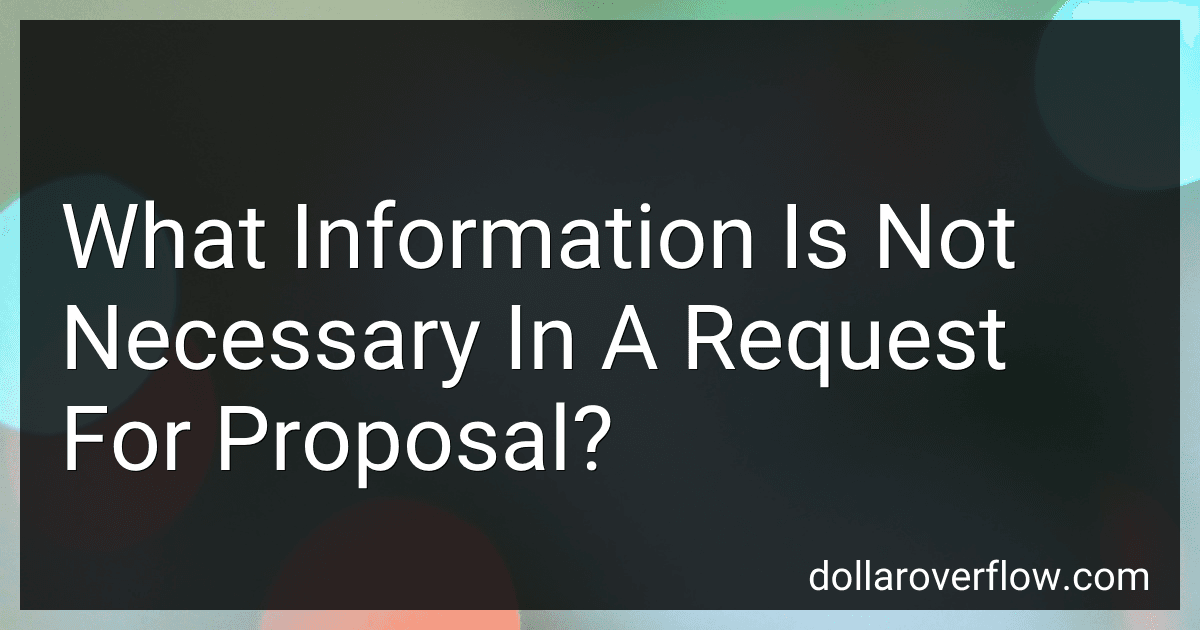In a Request for Proposal, it is important to provide detailed information about the project, its requirements, objectives, scope, timeline, and evaluation criteria. However, there are certain types of information that are not necessary to include in a request for proposal. This includes personal details of the requester or individuals involved, irrelevant background information, unnecessary jargon or technical details, and information that is not directly related to the project. It is important to keep the request for proposal focused on the essential details needed to evaluate and select the best vendor or contractor for the project. Including extraneous information can make the proposal more confusing and difficult to assess.
What is the purpose of including references in a request for proposal?
Including references in a request for proposal is important because it allows the proposer to showcase their past work and experience, which in turn helps the buyer evaluate the proposer's qualifications and capabilities. References can provide insight into the proposer's reputation, quality of work, reliability, and customer satisfaction. This information can help the buyer make a more informed decision when selecting a vendor for a project or service. Additionally, references can serve as a way to verify the proposer's claims and to ensure that they have the necessary skills and resources to successfully complete the project.
What is the process for selecting a vendor after reviewing proposals?
- Review and evaluate proposals: After receiving proposals from different vendors, the first step is to thoroughly review and evaluate each proposal based on factors such as cost, quality, experience, and reputation.
- Shortlist vendors: Once all proposals have been reviewed, shortlist vendors that best meet your requirements and criteria.
- Conduct interviews and demonstrations: Schedule interviews and demonstrations with shortlisted vendors to get a better understanding of their capabilities, expertise, and how well they can meet your needs.
- Conduct reference checks: Reach out to the vendor’s references to learn about their past performance, reliability, and overall satisfaction with their services.
- Negotiate terms and contracts: Once you have selected a preferred vendor, negotiate terms and conditions, pricing, and the scope of work. Be sure to clarify expectations and set clear deliverables in a formal contract.
- Finalize the selection: Once all terms are agreed upon, finalize the selection of the vendor and notify them of the decision.
- Monitor performance: Once the contract is in place, monitor the vendor’s performance and ensure they are meeting the agreed-upon terms and delivering on their promises. Make adjustments as needed to ensure a successful partnership.
How to ensure compliance with industry standards in a request for proposal?
- Clearly outline the industry standards that need to be complied with in the request for proposal (RFP) document. Provide specific details and requirements to ensure that all potential vendors understand what is expected.
- Include a section in the RFP where vendors must explicitly confirm their compliance with industry standards. This could be in the form of a checklist or questionnaire that vendors must complete as part of their proposal submission.
- Request documentation or evidence of compliance with industry standards from vendors as part of their proposal submission. This could include certifications, audits, or reports from third-party organizations.
- Include evaluation criteria related to compliance with industry standards in the scoring rubric for the proposals. This will ensure that vendors who do not meet the required standards are not considered in the selection process.
- Consider including a clause in the contract that requires the selected vendor to maintain compliance with industry standards throughout the duration of the project or contract. This will help to ensure ongoing adherence to the standards.
- Conduct regular audits or reviews of the vendor's performance to verify compliance with industry standards. This can help to identify any potential issues or discrepancies and address them in a timely manner.
